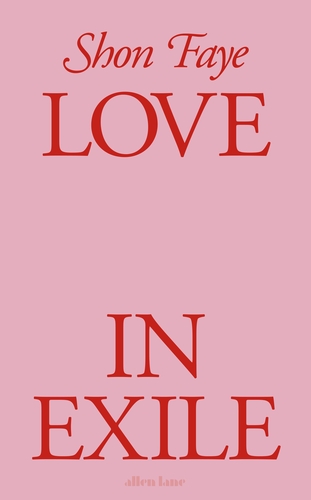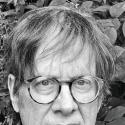As Valentine’s Day crests around us, and lonely hearts come out of their winter hibernation, what better time to publish writer and journalist Shon Faye’s second book Love in Exile? In part an examination of her own life, loves, and loss, Faye is exacting and passionate in her dissection of how we, as a society, understand the state of love: an unwieldy term that hides many painful mysterious, and which, too often, is subject to our unquestioning reverence.
While Love in Exile takes love as its overarching theme, it is structured more as a series of interlinking essays. These essays routinely counterpoint the personal and political; they cover a wide array of social phenomena, from addiction to dating; and reach, sensitively, into the spiritual side of our being, as in the final chapter, "Agape". There is a particularly poignant chapter on her (seemingly genetic) alcoholism and its substitution of the state of inebriation for the rush of infatuation, as well as its deadening effect when the solidity of the real world and real love appear over the horizon.
 Her opinions and experiences as described in Love in Exile are, in part, informed by Faye’s existence in the world as a trans woman, though her view is not circumscribed by this fact. She uses it as an opening through which to make wider-ranging observation; but she makes it clear that hers is one experience among many: her life and her experiences are a lens which enables her to examine the lives of both trans and cis women. (For those who are interested solely in this aspect of Faye’s life, her first book, The Transgender Issue, examines in-depth exactly what it says on the tin.)
Her opinions and experiences as described in Love in Exile are, in part, informed by Faye’s existence in the world as a trans woman, though her view is not circumscribed by this fact. She uses it as an opening through which to make wider-ranging observation; but she makes it clear that hers is one experience among many: her life and her experiences are a lens which enables her to examine the lives of both trans and cis women. (For those who are interested solely in this aspect of Faye’s life, her first book, The Transgender Issue, examines in-depth exactly what it says on the tin.)
That is, books like this are ameliorated by the autobiographical, and, in this instance, she writes herself into the text in a way that illuminates the subject, rather than performing self-obsession. A particularly good example of this is her chapter on motherhood, which, as an (at times overly) political pregnant woman myself, I very much enjoyed. Faye herself has no desire to be a mother: a rebuttal to the alarmist fretting of those who believe that trans women would like to deconstruct and denigrate what it means to be a woman from the womb outwards. It is deeply gratifying to have someone deftly explore the politics of it, arguing against the infantilisation and stereotyping that seems to kick in as soon as insemination happens. Her political convictions are clear here, as she declares in her preface: “I am hopeful that we can mend ourselves while simultaneously mending society.” She explores this hope with passion – but also (mostly) with balance.
There are times when Faye’s writing can feel a little dogmatic, which is perhaps an inevitable attitude caused by the modern dating scene. But although she is reductive about the behaviour of (mainly cis, heterosexual) men in Love in Exile, she is also self-aware and able to scrutinise her own shortcoming, admitting that societal conditioning is in no small way to blame for their poor behaviour. A later chapter delves into "cancel" culture: the mistake of blindly and unhelpfully cutting out those whose ideals don’t align with our own. She journeys through theorists such as Engels, de Beauvoir, and Greer, acknowledging their importance as well as their limitations. Greer is singled out in particular for her concerning and sustained attack on trans people. Faye is never dismissive (she unpacks problematic as well as sympathetic views), though she has to balance the thoroughness of her arguments against the relative brevity of the book (around 200 pages).
But balance is, in the end, achieved: Love in Exile is a great overview of how one person sees and experiences the world through the refraction of one of the most fundamental, and deeply perplexing, emotions (or feelings, or affects, or however we might try and contain "love"). But it’s also a call to arms: an inspiration for our own self-examination, and how we function both individually and collectively. This is by no means an easy task. Faye ends the text with a warning that there is no loss without love, and that: “Sometimes, the truth is that the agony has very little at all to tell me, except the certainty that I have a body that still feels and heart that still beats and so, still, a future beyond”.
- Love in Exile by Shon Faye (Allen Lane, £20)
- More book reviews on theartsdesk















Add comment